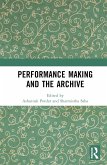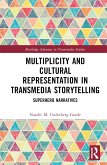- Gebundenes Buch
- Merkliste
- Auf die Merkliste
- Bewerten Bewerten
- Teilen
- Produkt teilen
- Produkterinnerung
- Produkterinnerung
African Film Studies is an accessible and engaging introduction to African cinemas, showcasing the diverse cinematic expressions across the continent. The book provides a succinct overview of the history, aesthetics, and theory of sub-Saharan African cinematic productions.
Andere Kunden interessierten sich auch für
![Historicizing Myths in Contemporary India Historicizing Myths in Contemporary India]() Historicizing Myths in Contemporary India160,99 €
Historicizing Myths in Contemporary India160,99 €![Activist Documentary Film in Pakistan Activist Documentary Film in Pakistan]() Rahat ImranActivist Documentary Film in Pakistan130,99 €
Rahat ImranActivist Documentary Film in Pakistan130,99 €![Filming the Line of Control Filming the Line of Control]() Filming the Line of Control181,99 €
Filming the Line of Control181,99 €![Performance Making and the Archive Performance Making and the Archive]() Performance Making and the Archive165,99 €
Performance Making and the Archive165,99 €![American Media and the Memory of World War II American Media and the Memory of World War II]() Debra RamsayAmerican Media and the Memory of World War II206,99 €
Debra RamsayAmerican Media and the Memory of World War II206,99 €![Multiplicity and Cultural Representation in Transmedia Storytelling Multiplicity and Cultural Representation in Transmedia Storytelling]() Natalie Underberg-GoodeMultiplicity and Cultural Representation in Transmedia Storytelling167,99 €
Natalie Underberg-GoodeMultiplicity and Cultural Representation in Transmedia Storytelling167,99 €![Tracing the Borders of Spanish Horror Cinema and Television Tracing the Borders of Spanish Horror Cinema and Television]() Tracing the Borders of Spanish Horror Cinema and Television180,99 €
Tracing the Borders of Spanish Horror Cinema and Television180,99 €-
-
-
African Film Studies is an accessible and engaging introduction to African cinemas, showcasing the diverse cinematic expressions across the continent. The book provides a succinct overview of the history, aesthetics, and theory of sub-Saharan African cinematic productions.
Hinweis: Dieser Artikel kann nur an eine deutsche Lieferadresse ausgeliefert werden.
Hinweis: Dieser Artikel kann nur an eine deutsche Lieferadresse ausgeliefert werden.
Produktdetails
- Produktdetails
- Verlag: Taylor & Francis
- 2nd edition
- Seitenzahl: 168
- Erscheinungstermin: 15. Dezember 2022
- Englisch
- Abmessung: 216mm x 140mm x 13mm
- Gewicht: 363g
- ISBN-13: 9781032160252
- ISBN-10: 103216025X
- Artikelnr.: 65912052
- Herstellerkennzeichnung
- Libri GmbH
- Europaallee 1
- 36244 Bad Hersfeld
- gpsr@libri.de
- Verlag: Taylor & Francis
- 2nd edition
- Seitenzahl: 168
- Erscheinungstermin: 15. Dezember 2022
- Englisch
- Abmessung: 216mm x 140mm x 13mm
- Gewicht: 363g
- ISBN-13: 9781032160252
- ISBN-10: 103216025X
- Artikelnr.: 65912052
- Herstellerkennzeichnung
- Libri GmbH
- Europaallee 1
- 36244 Bad Hersfeld
- gpsr@libri.de
Boukary Sawadogo is an Associate Professor of Cinema Studies at the City University of New York's City College and CUNY Graduate Center. As a specialist in African cinemas, he has published extensively through film reviews, articles, book chapters, and three books. Since 2020, he is the founding director of Harlem African Animation Festival.
Introduction Chapter 1: What Is African Cinema? Case Study: Aristotle's
Plot (Jean-Pierre Bekolo, 1996) PART I: HISTORY OF AFRICAN CINEMAS Chapter
2: History of African Cinemas Case Study: Sanders of the River (Zoltan
Korda, 1935): Celebration of the British Empire Chapter 3: Parallel
Movement: African Cinemas and African American Cinema Case Study: Black Is
King (Beyoncé, 2020) PART II: AESTHETICS IN AFRICAN CINEMAS Chapter 4:
Cinematography: Space, Time, and Rhythm Case Study: Yaaba (Idrissa
Ouédraogo, 1989) Chapter 5: The African Animated Film Case Study: Prince
Loseno (Jean-Michel Kibushi Ndajte Wooto, 2004) Chapter 6: Introductory
Study of African Film Scores Case Study: Non-diegetic Music: Space and Time
Dimensions of Film Music in La Noire de... (Black Girl) (Ousmane Sembène,
1966) PART III: AFRICAN FILM CRITICISM Chapter 7: Critical Reading Lenses
in the Study of African Cinemas Case Study: Atlantics (Mati Diop, 2019):
Migration in a Polygeneric Film PART IV: TRADITIONS AND PRACTICES IN
AFRICAN SCREEN MEDIA Chapter 8: Ethiopian Cinema. By Steven W. Thomas Case
Studies: Haile Gerima's Teza (2008) and La Borena (Belay Getaneh, 2013)
Chapter 9: Nollywood: A Popular and Commercial Cinema Case Study: The
Wedding Party (Kemi Adetiba, 2017) Chapter 10: The Rise of Local African TV
Serials: The Case of Burkina Faso and South Africa Course Proposal: African
Televisual Seriality PART V: NOTES ON STREAMING Chapter 11: The Streaming
Rush for Africa Conclusion: Film and New Media Education
Plot (Jean-Pierre Bekolo, 1996) PART I: HISTORY OF AFRICAN CINEMAS Chapter
2: History of African Cinemas Case Study: Sanders of the River (Zoltan
Korda, 1935): Celebration of the British Empire Chapter 3: Parallel
Movement: African Cinemas and African American Cinema Case Study: Black Is
King (Beyoncé, 2020) PART II: AESTHETICS IN AFRICAN CINEMAS Chapter 4:
Cinematography: Space, Time, and Rhythm Case Study: Yaaba (Idrissa
Ouédraogo, 1989) Chapter 5: The African Animated Film Case Study: Prince
Loseno (Jean-Michel Kibushi Ndajte Wooto, 2004) Chapter 6: Introductory
Study of African Film Scores Case Study: Non-diegetic Music: Space and Time
Dimensions of Film Music in La Noire de... (Black Girl) (Ousmane Sembène,
1966) PART III: AFRICAN FILM CRITICISM Chapter 7: Critical Reading Lenses
in the Study of African Cinemas Case Study: Atlantics (Mati Diop, 2019):
Migration in a Polygeneric Film PART IV: TRADITIONS AND PRACTICES IN
AFRICAN SCREEN MEDIA Chapter 8: Ethiopian Cinema. By Steven W. Thomas Case
Studies: Haile Gerima's Teza (2008) and La Borena (Belay Getaneh, 2013)
Chapter 9: Nollywood: A Popular and Commercial Cinema Case Study: The
Wedding Party (Kemi Adetiba, 2017) Chapter 10: The Rise of Local African TV
Serials: The Case of Burkina Faso and South Africa Course Proposal: African
Televisual Seriality PART V: NOTES ON STREAMING Chapter 11: The Streaming
Rush for Africa Conclusion: Film and New Media Education
Introduction Chapter 1: What Is African Cinema? Case Study: Aristotle's
Plot (Jean-Pierre Bekolo, 1996) PART I: HISTORY OF AFRICAN CINEMAS Chapter
2: History of African Cinemas Case Study: Sanders of the River (Zoltan
Korda, 1935): Celebration of the British Empire Chapter 3: Parallel
Movement: African Cinemas and African American Cinema Case Study: Black Is
King (Beyoncé, 2020) PART II: AESTHETICS IN AFRICAN CINEMAS Chapter 4:
Cinematography: Space, Time, and Rhythm Case Study: Yaaba (Idrissa
Ouédraogo, 1989) Chapter 5: The African Animated Film Case Study: Prince
Loseno (Jean-Michel Kibushi Ndajte Wooto, 2004) Chapter 6: Introductory
Study of African Film Scores Case Study: Non-diegetic Music: Space and Time
Dimensions of Film Music in La Noire de... (Black Girl) (Ousmane Sembène,
1966) PART III: AFRICAN FILM CRITICISM Chapter 7: Critical Reading Lenses
in the Study of African Cinemas Case Study: Atlantics (Mati Diop, 2019):
Migration in a Polygeneric Film PART IV: TRADITIONS AND PRACTICES IN
AFRICAN SCREEN MEDIA Chapter 8: Ethiopian Cinema. By Steven W. Thomas Case
Studies: Haile Gerima's Teza (2008) and La Borena (Belay Getaneh, 2013)
Chapter 9: Nollywood: A Popular and Commercial Cinema Case Study: The
Wedding Party (Kemi Adetiba, 2017) Chapter 10: The Rise of Local African TV
Serials: The Case of Burkina Faso and South Africa Course Proposal: African
Televisual Seriality PART V: NOTES ON STREAMING Chapter 11: The Streaming
Rush for Africa Conclusion: Film and New Media Education
Plot (Jean-Pierre Bekolo, 1996) PART I: HISTORY OF AFRICAN CINEMAS Chapter
2: History of African Cinemas Case Study: Sanders of the River (Zoltan
Korda, 1935): Celebration of the British Empire Chapter 3: Parallel
Movement: African Cinemas and African American Cinema Case Study: Black Is
King (Beyoncé, 2020) PART II: AESTHETICS IN AFRICAN CINEMAS Chapter 4:
Cinematography: Space, Time, and Rhythm Case Study: Yaaba (Idrissa
Ouédraogo, 1989) Chapter 5: The African Animated Film Case Study: Prince
Loseno (Jean-Michel Kibushi Ndajte Wooto, 2004) Chapter 6: Introductory
Study of African Film Scores Case Study: Non-diegetic Music: Space and Time
Dimensions of Film Music in La Noire de... (Black Girl) (Ousmane Sembène,
1966) PART III: AFRICAN FILM CRITICISM Chapter 7: Critical Reading Lenses
in the Study of African Cinemas Case Study: Atlantics (Mati Diop, 2019):
Migration in a Polygeneric Film PART IV: TRADITIONS AND PRACTICES IN
AFRICAN SCREEN MEDIA Chapter 8: Ethiopian Cinema. By Steven W. Thomas Case
Studies: Haile Gerima's Teza (2008) and La Borena (Belay Getaneh, 2013)
Chapter 9: Nollywood: A Popular and Commercial Cinema Case Study: The
Wedding Party (Kemi Adetiba, 2017) Chapter 10: The Rise of Local African TV
Serials: The Case of Burkina Faso and South Africa Course Proposal: African
Televisual Seriality PART V: NOTES ON STREAMING Chapter 11: The Streaming
Rush for Africa Conclusion: Film and New Media Education








